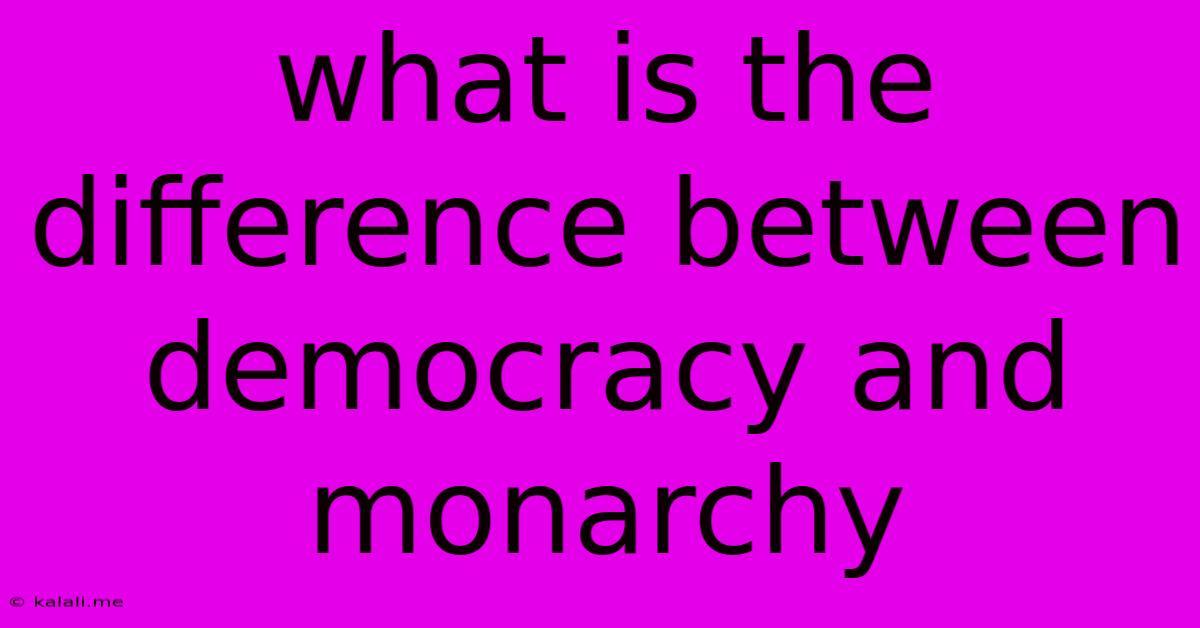What Is The Difference Between Democracy And Monarchy
Kalali
Jun 13, 2025 · 3 min read

Table of Contents
Democracy vs. Monarchy: Understanding the Core Differences
The terms "democracy" and "monarchy" represent fundamentally different approaches to governing a nation. While both aim to maintain order and provide for the needs of their citizens, they achieve this through contrasting systems of power and authority. This article will delve into the key distinctions between these two major forms of government, exploring their historical contexts, core principles, and practical implications.
What is Democracy?
At its core, democracy is a system of government where supreme power is vested in the people and exercised by them directly or indirectly through a system of representation, typically involving periodic free and fair elections. The defining characteristic of a democracy is the sovereignty of the people. This means that ultimate authority rests with the citizens, who have the right to participate in the decision-making processes that affect their lives.
Key Features of a Democracy:
- Free and Fair Elections: Citizens have the right to choose their leaders through regular, competitive elections. These elections must be free from coercion and manipulation, ensuring that the outcome reflects the genuine will of the electorate.
- Rule of Law: Everyone, including those in power, is subject to and accountable under the law. This prevents arbitrary use of power and ensures fairness and justice for all.
- Protection of Rights and Freedoms: Democracies typically guarantee fundamental rights and freedoms, such as freedom of speech, assembly, and religion. These rights protect citizens from government overreach and allow them to express their views and participate in public life.
- Separation of Powers: Power is distributed among different branches of government (legislative, executive, and judicial) to prevent concentration of power and ensure checks and balances.
- Citizen Participation: Citizens have various avenues to participate in the political process, including voting, joining political parties, lobbying, and engaging in peaceful protests.
What is Monarchy?
A monarchy is a form of government where supreme power is held by a single person, the monarch, typically a king or queen, who usually inherits their position. This power is often hereditary, passing from one generation to the next within a royal family. While the extent of the monarch's power varies significantly across different monarchies, the fundamental principle remains the same: supreme authority resides in a single individual.
Key Features of a Monarchy:
- Hereditary Succession: The monarch typically inherits their position, passing power down through their family line. This contrasts sharply with the elective nature of democratic leadership.
- Concentrated Power: The monarch holds considerable power, although the degree of power can vary greatly depending on whether it is an absolute monarchy or a constitutional monarchy.
- Limited Citizen Participation: In absolute monarchies, citizen participation in government is minimal. Even in constitutional monarchies, the monarch's role is largely symbolic, with real political power residing in elected officials.
- Traditional Legitimacy: Monarchical legitimacy is often based on tradition, history, and religious beliefs. This contrasts with the legitimacy derived from popular consent in democracies.
- Potential for Abuse of Power: The concentrated power in a monarchy creates the potential for abuse of power, especially in absolute monarchies where there are no checks and balances.
Key Differences Summarized:
| Feature | Democracy | Monarchy |
|---|---|---|
| Source of Power | The people | The monarch (hereditary) |
| Leader Selection | Elected | Inherited |
| Citizen Participation | High | Low (absolute), Limited (constitutional) |
| Accountability | High (through elections and institutions) | Lower (absolute), Higher (constitutional) |
| Power Distribution | Shared (separation of powers) | Concentrated (absolute), Shared (constitutional) |
Conclusion:
Democracy and monarchy represent vastly different models of governance. Democracy prioritizes citizen participation, accountability, and the rule of law, while monarchy centers power in a single individual. Understanding these core differences is essential for comprehending the diverse political landscapes across the globe and the ongoing debates surrounding the best ways to govern societies effectively and justly.
Latest Posts
Latest Posts
-
How Fast Does A Peacock Run
Jun 14, 2025
-
Which Of These Lines Is A Metaphor
Jun 14, 2025
-
Difference Between Quality Control And Quality Assurance Pdf
Jun 14, 2025
-
Gpa Requirements For University Of Memphis
Jun 14, 2025
-
What Are The Prime Factors Of 156
Jun 14, 2025
Related Post
Thank you for visiting our website which covers about What Is The Difference Between Democracy And Monarchy . We hope the information provided has been useful to you. Feel free to contact us if you have any questions or need further assistance. See you next time and don't miss to bookmark.